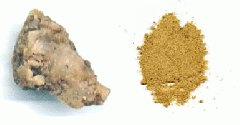Difference between revisions of "Asafoetida"
(Created page with "{{Infobox_Other_organic | image = asafoetida.jpg | origin = Afghanistan, India | stowage factor = ...") |
|||
| Line 1: | Line 1: | ||
{{Infobox_Other_organic | {{Infobox_Other_organic | ||
| − | | image = | + | | image = Asafoetida.gif |
| origin = Afghanistan, India | | origin = Afghanistan, India | ||
| stowage factor = 1,17/1,23 (cases) | | stowage factor = 1,17/1,23 (cases) | ||
Revision as of 15:41, 8 October 2012
| Infobox on Asafoetida | |
|---|---|
| Example of Asafoetida |  |
| Facts | |
| Origin | Afghanistan, India |
| Stowage factor (in m3/t) | 1,17/1,23 (cases) |
| Humidity / moisture | |
| Ventilation | |
| Risk factors | See text |
Asafoetida
Description
Asafoetida (Ferula assafoetida), (also known as devil's dung, stinking gum, asant, food of the gods, giant fennel, Jowani badian, hing and ting) is the dried latex (gum oleoresin) exuded from the living underground rhizome or tap root of several species of Ferula, which is a perennial herb (1 to 1.5 m high). The species is native to the mountains of Afghanistan, and is mainly cultivated in nearby India. Asafoetida has a pungent, unpleasant smell when raw, but in cooked dishes, it delivers a smooth flavor, reminiscent of leeks.
Application
The spice is used as a digestive aid and flavour enhancer, as a condiment in food and in pickles. Often used in Indian recipes.
Shipment / Storage / Risk factors
Very penetrating and offensive smell. Beware of odour contamination to other cargoes stowed in the vicinity. It is often stored in air-tight containers.
Deck or underdeck stowage to be decided per shipment.











